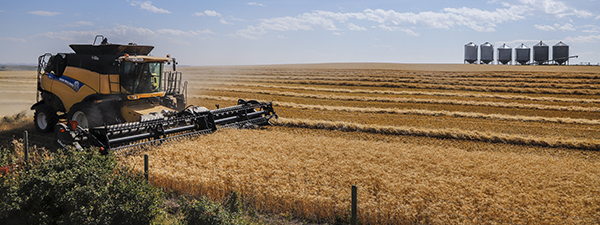| | | | | | Our planet is heating up, causing tremendous upheaval for life as we know it.
Every Monday, The Climate Barometer from CTVNews.ca delves into
climate science and looks at what life on a changing planet will mean.
| 
| DON'T IGNORE THE DROUGHT
It was truly a wild year for extreme weather in Canada, with devastating fires, damaging floods, and the hottest temperature ever recorded here -- and that was just in one province.
Tucked between those headline-grabbing events in British Columbia on Environment and Climate Change Canada's list of the top weather stories of 2021, though, you'll find an entry that seemed to receive far less attention.
Third place on the list was awarded to the drought that led to states of ecological disaster in some Prairie communities this summer and has been called the worst in 60 years. At one point shortly before the usual harvest time, 99 per cent of agricultural land in the Prairies was classified as being in drought.
While drought is generally not as big a news story as fires, storms or other extreme weather events, we knew even as it was occurring that it would have a significant and long-lasting impact on Canada.
Fast-forward a few months, and we're learning just how much damage -- physical, economic and otherwise -- was caused by the prolonged dry spell.
Statistics Canada revealed earlier this month that wheat production across the country was nearly 40 per cent lower this year than it was in 2020, largely because of the poor conditions in the West. Our oat and barley crops suffered similar shrinkage.
With that kind of drop in production, it's been difficult for ranchers to even find enough feed for their animals. Farmers in the Maritimes have been donating hay and shipping it across the country to help keep western herds alive.
If conditions next year are dry enough for drought to again show up as one of the top 10 weather stories in the country, it will mean an exceedingly desparate situation in the Western Canadian agricultural sector.
|  | THE BRIEFING
Taking a look at stories about the environment that caught our attention this week - We told you last week about worries that a key Antarctic ice shelf could collapse within the next five years, with potentially calamitous effects on our climate. Since then, we've learned of another reason why these ice shelves are important: they hold far more life than previously thought. Researchers with the British Antarctic Survey say they've made an unexpected and stunning discovery of 77 species living beneath an ice shelf -- more biodiversity than can be found in some areas that have far more access to open water and sunlight.
- A research team in the United States, meanwhile, has been doing a deep dive on a problem that hits a little closer to home: what does climate change mean for coffee? They've concluded that the quality of coffee can be significantly affected by factors including temperature, carbon dioxide levels in the air, nutrient management and exposure to pests -- and that there are already some adaptation strategies working to preserve the coffee taste so many know and love.
- If you happen to be resolving to learn some new words in 2022, you might want to start with "thermokarst." It's the phenomenon of permafrost thawing to the point where it suddenly collapses. This is a problem not just for the surrounding ecosystem but for the entire world, because permafrost often holds vast reserves of carbon that, upon collapse, are released into the atmosphere. Thermokarst is not well understood by scientists. Researchers from the University of Illinois have been looking into it, and say thermokarst activity in the Alaskan Arctic has sped up by 60 per cent since the 1950s -- with more increases to come as the planet warms.
| | 
| FOCUS
An in-depth look at an important climate issue It's the holiday season, and that means that -- subject to government restrictions -- you might find yourself around some people who you haven't seen in a while.
Depending on the sort of people they are and the sort of gathering it is, it's not out of the realm of possibility that climate change might be a topic of conversation.
As anyone well-versed on the issue knows, the climate crisis can be difficult to discuss with those who have differing views, or even with those who haven't given it much thought.
Researchers have found that for many people, views on climate change line up with what they were taught in school. When textbooks frame climate change as a theory, for example, students who read those books are more likely to see it the same way.
Then there are those who are quite certain about their views, but have very different views than those who would, for example, subscribe to a newsletter about climate news. A paper published earlier this year by University of Oregon economist Grant McDermott argues that changing the mind of a climate skeptic tends to require many years and mountains of evidence -- not criteria that can be met in a fleeting conversation at a holiday party.
But that doesn't mean it's hopeless. Other recent research suggests that many people who believe climate-related disinformation remain open to the science -- they just need to be convinced that they should believe the science over what they've already internalized.
Insults and personal attacks don't help that process along. Neither do big words and detailed technical explanations.
Instead, experts say, the best path forward may depend on the political leanings of the person you're trying to convince. Liberal-minded people are more likely to be swayed by stories of the negative consequences of climate change, while it may be easier to reach the conservative-minded by explaining how they themselves will be affected.
Whoever you're talking to, and whatever your approach, don't expect to change any minds in one conversation. Listen to your conversation partner's thoughts, demonstrate that you understand their viewpoint, and try to leave them with a little something to think about. That's the recipe for feeling like you've accomplished something without derailing the fesitivities. | 
| RISKIN REPORT
CTV News Science and Technology Specialist Dan Riskin shares his exclusive insights Politicians who want to address the climate crisis often have to face another problem: re-election.
If their moves are seen as too much too fast, many of them think, they'll be thrown out of office in favour of someone who will do less.
However, history shows us that under certain circumstances, politicians can face even more trouble if they choose to let climate change progress unchecked.
In this week's Riskin Report, CTV News Science and Technology Specialist Dan Riskin explains how over a millennium of Chinese history, political dynasties were more likely to come to an end when people were being adversely affected by a changing climate. | | The Climate Barometer is curated by CTVNews.ca journalist
Ryan Flanagan. Like what you see here? Get the latest headlines
whenever you want them from our Climate and Environment hub. |
| | | Was this email forwarded by a friend? Sign up for yourself here. | | | | | You are subscribed to CTV News as aymentanaze.news@blogger.com
You have received this message from CTV News, a Bell Media property.
Bell Media Inc.
9 Channel Nine Ct,
Scarborough, ON M1S 4B5
Privacy Policy | Unsubscribe
© 2021 Bell Media All rights reserved. |  | | | | | |
Commentaires
Enregistrer un commentaire
Thank you to leave a comment on my site